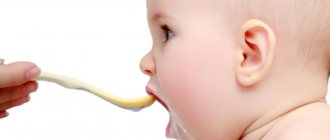How can you tell if your baby has colic?
The main question is usually whether you are missing symptoms of something more serious.
If you notice that the child begins to cry
- unusual timbre (louder, shriller, similar to a cry of pain),
- much more often and for longer than before,
- without calming down from what had helped before.
carefully examine his skin, do not forget to take off his socks, diaper (it happens that an adult’s hair accidentally pinches a finger or penis, wrapped around the base) remember what happened before the crying began, measure the temperature.
Urgently inform the doctor (“red flags” in the child’s condition)
- Cries for more than two hours straight without calming down.
- The temperature is above 38 degrees in an undressed baby.
- It has been dropped or shaken violently.
- He began to react worse to you, looks inhibited, “limp.”
- Stopped eating and urinating as usual.
- There is blood in the stool.
- Age 1 month (+/− a few days).
If there is none of this, and the baby looks as usual between bouts of crying, there is definitely no need to urgently run somewhere. This means the reason is not dangerous, and it can be discussed with your treating pediatrician during his working hours.
Now notice how you feel when your baby cries.
Urgently see loved ones/psychologist/social worker (“red flags” in the mother’s condition)
- You feel that if the child continues to scream, you may lose your temper and treat him roughly.
- It seems to you that he is manipulating and mocking.
- You can't do this anymore, life doesn't bring you joy.
These are signs that the mother’s rest should come first in the family. If rest does not help, these are signs of postpartum depression, you should definitely consult a doctor (psychiatrist or psychotherapist). If there are no loved ones, you can be supported in the social protection department, antenatal clinic, center for psychological assistance to the population, and charitable organizations that help mothers.
When to see a doctor?
The reason for contacting a doctor is the ineffectiveness of all previously given recommendations and the persistence or intensification of colic symptoms in the child. Baby crying can also be caused by other diseases or functional disorders, which can only be identified by a doctor with the help of additional tests.
You should also seek medical help if your child experiences the following changes or symptoms:
- Vomiting of blood or partially digested food.
- Loss of appetite.
- Delayed weight gain and growth.
- Breathing disorders, shortness of breath.
Typical symptoms of colic in a baby
They can occur slightly differently, there are no strict mandatory signs, but there is a “classic”, most common picture. For many children, colic begins and ends at the same time of day, often in the afternoon, after feeding. Mothers quickly begin to distinguish them from ordinary screams.
During a colic baby:
- The crying becomes shrill, like a cry of pain, inconsolable.
- Muscle tone increases: he knocks his legs, presses them to his stomach, clenches his fingers into fists, and arches.
- There may be bloating, rumbling in the stomach, sometimes it becomes easier after the gas passes.
Causes of colic in a baby
The exact cause of colic is unknown. From a parent's perspective, there may be no potential cause for concern at all. According to modern medical data, some internal and external factors can trigger colic. Let's take a closer look at them.
Insufficient development of the digestive system
The digestive system of newborn children is not always able to quickly and painlessly adapt to a new way of eating immediately after birth. Until recently, the child was fed through the umbilical cord, and now he must eat milk. It is not surprising that in the first months, the muscle fibers of the gastrointestinal tract are forced to adapt to oral nutrition, and their spasms (excessively strong contractions) in the meantime can cause colic. This theory is also supported by a greater tendency for premature babies to develop colic.
Also, at an early age, weakness of the sphincter located at the junction of the esophagus and the stomach may occur. Because of this, when lying down and immediately after feeding, reflux occurs - the reverse flow of gastric contents into the esophagus. This provokes discomfort and heartburn, which is manifested by the baby’s anxiety.
Dysbacteriosis
An important component of normal digestion is intestinal microflora. Immediately after birth, the baby's intestines are sterile, that is, not inhabited by any bacteria. Along with the first contacts with the outside world and feeding, the child’s gastrointestinal tract is gradually filled with necessary microorganisms.
In the first months of a child’s life, the composition of intestinal bacteria changes greatly, which can provoke digestive disorders and the development of colic.
Sensitivity to external influences
In infancy, any external influence can affect the condition of the infant. Therefore, factors such as cold or hot air, a wet diaper, loud noise or too bright light can provoke an overactive response from the nervous system, including colic.
Intolerance to mother's and cow's milk
Lactase deficiency is relatively rare in children - a deficiency of the lactase enzyme necessary for the breakdown and digestion of mother's milk. An allergy to casein, a protein in cow's milk, may also be a likely cause.
In both observations, the digestion process becomes uncomfortable and painful, which is accompanied by the appearance of colic in the child.
Important! In nursing mothers who experience constant stress or emotional stress, the composition of breast milk may change under the influence of hormonal fluctuations. This is considered one of the potential causes of colic.
Infant migraine
The likely cause of colic is infant migraine. This variant of migraine is caused by the adaptation of the central nervous system to an unfamiliar external world - sounds, images and objects. It can also be caused by increased intracranial pressure, for example, after birth trauma or various encephalopathies.
What happens when there is colic in the abdomen of a newborn?
It may seem surprising, but doctors have not found an exact explanation. Many people use the term “intestinal colic in children,” but scientists suggest that it is not just a matter of digestion.
It is believed that with colic, normal beneficial bacteria settle in the child’s stomach and the intestines “learn to move.” Another explanation is excessive or disordered stimulation of the nervous system, as in migraines in adults, which also results in pain.
In any case, colic in newborns does not require additional examinations (images, blood tests, stool tests, etc.). There is no need to look for reasons for your behavior, because the reason is not that your parents do or don’t do something. This is a variant of normal development.
How to help your child and yourself?
What to do during attacks? You can try the following:
- Distract your child:
- massage your tummy
- create a uniform noise (vacuum cleaner, washing machine, heartbeat sound),
- gently rock in a hammock, crib or stroller,
- take it in a sling,
- give me a pacifier
- swaddle loosely (however, pediatricians do not recommend that the baby sleep in swaddles, especially if he can roll over on his stomach. This increases the risk of sudden death of the baby),
- change the environment: for some people there are too many impressions, it is better for him to dim the lights and be alone, for others, on the contrary, they calm down on a walk when they look around;
- Reduce air swallowing:
- use special nipples,
- apply correctly to the chest,
- hold upright for a few minutes after feeding);
It is advised to try eliminating strong allergens (milk, eggs, wheat, nuts) from your diet one at a time for several days. But this is considered necessary only if the doctor finds signs of allergies or food intolerance in you or your child. Current recommendations usually do not involve changing the diet while breastfeeding (for example, it is not necessary to eliminate all vegetables and fruits).
- If your baby immediately feels better after defecation, you can stimulate it with a gas tube, suppositories with glycerin, or microenemas (they are equally effective). Only soft tubes of neonatal sizes may be used, with lubricant (Vaseline, vegetable oil or others). It is unlikely that you will want to do this too often, but if it helps relieve acute attacks, do not worry, the child will not become “dependent” on these procedures.
- Probiotics can help breastfed babies (the effect of L.reuteri bacteria has been proven).
There are methods that in studies did not differ from the “dummy”, so the doctor will not recommend them as effective. However, they are safe enough that you can try them yourself if it makes you feel better.
- Preparations with simethicone (if your child is prescribed thyroxine, consult your doctor before).
- “Waters” with herbal ingredients (dill, raisins).
If a “colic remedy” contains many unknown herbal and other ingredients, it should be avoided. This formulation may not have been sufficiently studied for use in infants.
Try different methods, but spend resources only on those that have a noticeable effect. Sometimes it's better to just wait.
How to relieve colic at home?
Self-control of colic at home can be divided into two main stages: eliminating direct gastrointestinal disorders and preventing their reappearance.
When colic appears in a child, it is recommended to do the following:
Step 1. Light massage
Body contact helps normalize the functioning of the gastrointestinal muscles. During the onset of colic, it will be useful to lightly massage the baby's abdomen in a clockwise circular motion. Your hands should be warm.
Step 2. Exercise "bicycle"
The classic cycling exercise can also help promote the passage of intestinal contents. To do this, you need to take the child by the feet and perform circular movements as if he were pedaling.
Step 3. Warmth on baby's tummy
Exposure to heat can help with impaired intestinal motility and colic in a child. To do this, you can use a bottle of liquid that is warm to the touch or a special heating pad.
Feeding the baby correctly
For bottle-fed infants who are prone to developing colic, it is recommended to use infant formula that contains partially digested milk proteins. Most often they have a mark on the packaging like “delicate”.
Important! To improve digestion, prebiotics (galactooligosaccharides for the development of intestinal microflora) are added to some milk formulas. Other mixtures are enriched with probiotics (Bifidobacterium lactis and other live bacteria).
When breastfeeding, it is important to pay attention to the correct attachment of the baby. His mouth should completely cover the areola of the nipple. When bottle-feeding, you should hold the bottle so that the milk or formula completely fills the nipple. This will prevent air from being swallowed, which also causes colic.
Also, problems with swallowing air during feeding can be compensated for by promoting belching in the child. To do this, you need to hold the baby for some time (about 15-20 minutes) after feeding in an upright position on your chest, tilting his head over your shoulder.
Also, during feeding, you should avoid sudden movements, loud noises and flashes of light, which can distract the baby from the feeding process.
In addition to proper feeding, it is important to monitor the amount of milk or formula consumed. Overeating puts additional stress on the baby's digestive system, causing colic. One of the signs of overeating is frequent regurgitation.
The diet of a nursing mother should also be balanced. It is recommended to avoid foods that cause flatulence (legumes, onions, garlic, etc.), spicy, fried and fatty foods, as well as potential allergens - chocolate, citrus fruits, honey, eggs, seafood.
Treatment of colic in children
Colic goes away on its own, usually by 4 months of age. Since the exact cause of their development has not been established, there is also no clear treatment. The actions that are recommended in such cases are aimed at alleviating the child’s condition and preventing possible undesirable consequences.
The priority points in the treatment of colic in children are adherence to the daily routine and nutrition of both the child and the mother.
If there is a need for artificial feeding, in addition to choosing the appropriate mixtures, it is important to promptly introduce into the diet special fermented milk products containing prebiotics and probiotics.
Drug treatment of colic is represented by drugs that reduce gas formation in the intestines (for example, simethicone) or drugs that stimulate digestion and have antispasmodic properties (fennel extract and oil). Enzymes can also be used - Creon, Pancreatin, strictly as prescribed by the doctor.











